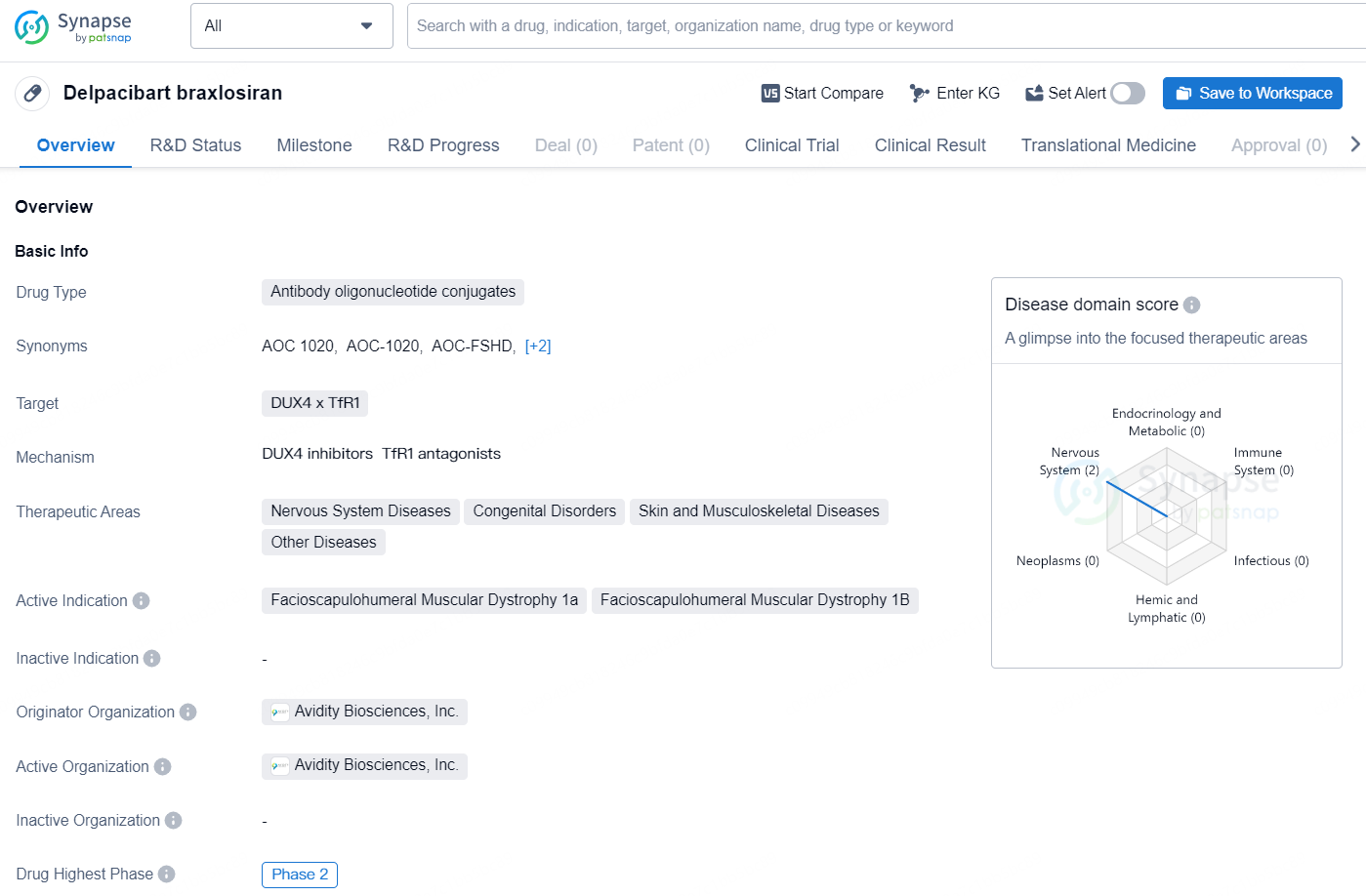Avidity Biosciences Launches Biomarker Study in FORTITUDE™ Trial for Accelerated Approval of Delbrax/AOC 1020
Avidity Biosciences, Inc. (Nasdaq: RNA), a biopharmaceutical firm focused on developing a new class of RNA-based treatments known as Antibody Oligonucleotide Conjugates (AOCs™), has announced the launch of a biomarker cohort in the Phase 1/2 FORTITUDE™ trial evaluating delpacibart braxlosiran (del-brax/AOC 1020) in individuals with facioscapulohumeral muscular dystrophy (FSHD). The company is targeting a possible expedited approval pathway for del-brax and anticipates that recruitment for the biomarker cohort will be finished by the first half of 2025. Additionally, Avidity is set to begin a functional cohort in the first half of 2025. Enrollment for the FORTITUDE Open-label Extension study (OLE) is also currently in progress.
👇Unlock in-depth information about this drug - its R&D Status, Core Patent, Clinical Trials, and Global Approval Status. Click on the image below and explore the latest data immediately.
Del-brax is the inaugural investigational treatment aimed at addressing the primary cause of FSHD by targeting the gene responsible for the disease, double homeobox 4 (DUX4). At present, there are no sanctioned therapies available for FSHD, which is a rare genetic condition characterized by persistent muscle function deterioration, substantial pain, fatigue, and progressive disability throughout one’s life.
“The launch of the biomarker cohort is a significant milestone in our strategy to explore a potential expedited approval pathway for del-brax, the first candidate treatment to directly address the fundamental issue of FSHD,” stated Steve Hughes, M.D., the chief medical officer at Avidity. “We are very encouraged by the del-brax 2 mg/kg results, which exhibited unprecedented and consistent decreases in DUX4-regulated genes, notable reductions in novel circulating biomarkers and creatine kinase levels, along with trends suggesting functional improvement while maintaining an acceptable safety and tolerability profile at the four-month mark. We are accelerating our clinical research for del-brax, fully aware of the need to offer a potential new option for individuals with FSHD who currently lack treatment alternatives.”
The biomarker cohort within the FORTITUDE trial will evaluate the effects of del-brax administered at 2 mg/kg every six weeks in participants aged 16 to 70 with FSHD. The primary objectives of the trial include assessing changes in DUX4-related gene expression and circulating biomarkers influenced by DUX4.
For individuals affected by FSHD, it is critical to ensure persistent suppression of DUX4, as abnormal expression of this gene is detrimental to muscle health. Observations regarding safety, tolerability, reduction in circulating biomarkers, and creatine kinase levels were consistent between patients receiving dosages of 2 mg/kg or 4 mg/kg of del-brax. Given this resemblance, Avidity decided on the 2 mg/kg dose for administration every six weeks to ensure continuous DUX4 suppression for both the biomarker and functional cohorts.
In June of this year, Avidity announced encouraging preliminary findings from the Phase 1/2 FORTITUDE trial, which indicated a remarkable and consistent reduction exceeding 50% in DUX4-regulated gene levels, average drops of 25% or more in novel circulating biomarkers and creatine kinase, signs of functional improvement, and a favorable safety profile in individuals with FSHD presented at the 31st Annual FSHD Society International Research Congress.
👇Explore the latest research progress on drug-related developments, indications, therapeutic organizations, clinical trials, results, and patents by clicking on the targeted picture link below. Unfold a world of comprehensive information on this target in just a click!
According to the data provided by the Synapse Chemical, As of November 5, 2024, there are 1 investigational drug for the DUX4 x TfR1 target, including 2 indications, 1 R&D institution involved, with related clinical trial reaching 2, and as many as 131 patents.
Delpacibart braxlosiran is an antibody oligonucleotide conjugate drug that targets DUX4 x TfR1 and is being developed for the treatment of various therapeutic areas, including Nervous System Diseases, Congenital Disorders, Skin and Musculoskeletal Diseases, and Other Diseases. The active indications for which this drug is intended to treat include Facioscapulohumeral Muscular Dystrophy 1a and Facioscapulohumeral Muscular Dystrophy 1B. The drug is being developed by Avidity Biosciences, Inc., and is currently in the highest global phase of development, which is Phase 2.






